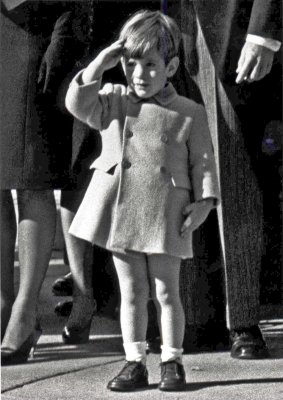Bill Scott: Now, let's listen to the stories that are associated with these sounds, and to all the other stories of the year that made history and changed people's lives ...
Herb Brubaker: "Dallas, November 22nd, and the world was changed. This is Herb Brubaker, RPI White House Correspondent, reporting on John F. Kennedy and his successor on Year in Review.
"The Texas sun smiled as the Presidential plane landed at Dallas's Love Field. An enthusiastic crowd greeted Mr. and Mrs. Kennedy. This was the last leg of a three-day visit to Texas. The motorcade slowly made its way through town. Sharing the open convertible with the President and his wife were Governor and Mrs. John Connelly. Mrs. Connelly explains the mood of the moment."
Mrs. John Connelly: "'The people couldn't have been friendly; the crowds couldn't have been more wonderful, more generous in their reaction to the President. I just had such a good feeling about the -- the way they had received him in this city. I had just turned around and said to him, "You can't say Dallas doesn't love you, Mr. President.'"
Herb Brubaker: "A rifle shot punctured the autumn air. The President clutched his throat; a second shot, and the Governor was hit; a third bullet struck the rear of the President's head. Mrs. Kennedy screamed, 'Oh, no' and climbed to the rear of the car for help. The limousine sped to nearby Parkland Memorial Hospital. The President was dead.
"The events that followed were blurred with tears. The President was given last rites; the Governor was operated on, and he survived. A policeman was shot and killed by the fleeing assassin. After a scuffle, police captured the suspect, left-winger Lee Harvey Oswald, in a Dallas movie theatre. Standing in a crowded airplane compartment, Lyndon Johnson was sworn in as 36th President of the United States. And by nightfall, the body of the late President, Mrs. Kennedy, President and Mrs. Johnson were back in Washington. Jacqueline Kennedy, still wearing the pink suit in which she was dressed that morning, was splattered with her husband's blood.
"The next day Washington was dark and rainy. The Kennedy family, friends and officials visited the White House's East Room, where the body lay in repose.
"Sunday, the flag-draped casket was placed on a caisson and drawn by six gray horses up Pennsylvania Avenue to the Capitol's Rotunda, where the body lay in state for thousands to see.
"The solemn procession was interrupted by a bulletin from Dallas. Lee Oswald was being transferred from one jail to another. The nation heard it being described as it happened.
Unknown speaker: "Yes, there is Lee Oswald. He's been shot! He's been shot!"
Herb Brubaker: "Dallas police captain Will Fritz describes the unbelievable scene.
Captain Will Fritz: "As we stepped from the jail door to go to the car, there of course was a large crowd of newspapermen there, and evidently this man slipped in among them in some... some way. He stepped out of the, ran up to this man and shot him while he was handcuffed to one of the officers."
Herb Brubaker: "Charged with Oswald's murder, Dallas nightclub owner Jack Ruby.
"Though Oswald was never brought to trial, the evidence left no doubt. His fingerprints were on the paper in which the murder weapon was wrapped. Particles of his clothing were found on the rifle. Declared Dallas District Attorney Henry Wade.
District Attorney Henry Wade: "I would say that without any doubt he's the killer. The law says beyond a reasonable doubt and to a moral certainty, which I... there's no question that he was the killer of President Kennedy."
Herb Brubaker: "President Johnson later named a seven-man Commission, headed by Supreme Court Chief Justice Earl Warren, to investigate the assassination and Oswald's murder.
"Monday morning, the President's casket was again placed on the caisson. The cortege returned from the Capitol to the White House, where Mrs. Kennedy joined world leaders, including French President Charles De Gaulle, British Prime Minister Sir Alec Douglas-Home, West German Chancellor Ludwig Erhard, Canadian Prime Minister Lester Pearson and Soviet Deputy Premier Anastas Mikoyan. Together, they walked the nine blocks from the White House to St. Matthew's Cathedral, where a Pontifical Mass was celebrated. Then the funeral procession went to Arlington National Cemetery, and high on a hill overlooking the city he loved, John F. Kennedy was laid to rest.
Herb Brubaker: "These were the words of John Kennedy at his Inaugural Address, January 1961.
President John F. Kennedy: "Let every nation know, whether it wishes us well or ill, that we shall pay any price, bear any burden, meet any hardship, support any friend, oppose any foe to assure the survival and the success of liberty. All this will not be finished in the first 100 days, nor will it be finished in the first 1,000 days, nor in the life of this Administration, nor even perhaps in our lifetime on this planet. But let us begin."
Herb Brubaker: "In two years and ten months, the Kennedy Administration made its beginning -- a treaty banning nuclear tests in the atmosphere, outer space and underwater; a Peace Corps of dedicated Americans working in remote parts of the world; a Government program retraining workers displaced by automation; a revolutionary mental-health program; a greater drive for equal Negro rights; greater emphasis on the arts -- and the world was reminded America is tough, as demonstrated in Cuba, and when a Yale University professor was jailed and held incommunicado by the Soviets.











